高一英语人教版必修3《Unit 1 Festivals around the world》教案:Step V Assignment
- 格式:doc
- 大小:525.00 KB
- 文档页数:6
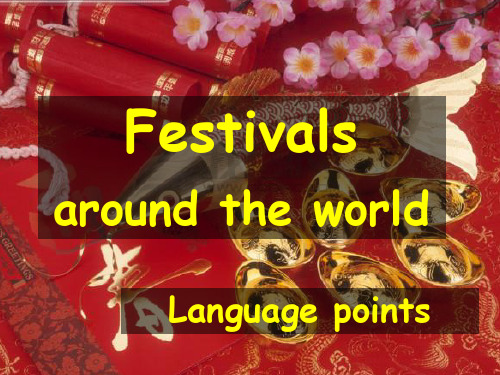
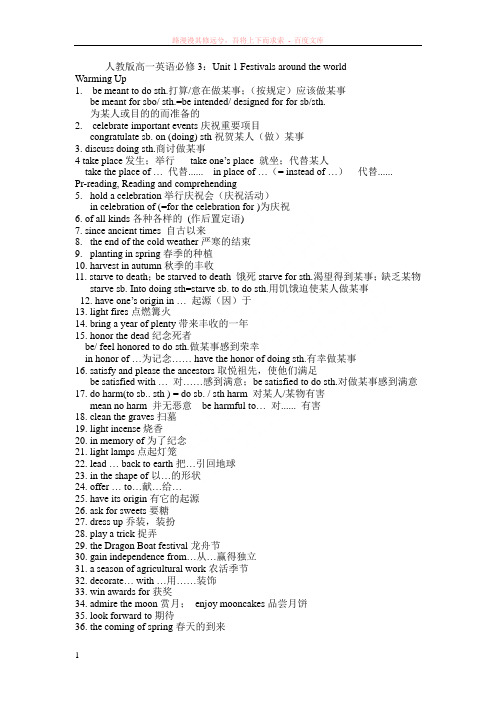
人教版高一英语必修3:Unit 1 Festivals around the worldWarming Up1.be meant to do sth.打算/意在做某事;(按规定)应该做某事be meant for sbo/ sth.=be intended/ designed for for sb/sth.为某人或目的的而准备的2.celebrate important events庆祝重要项目congratulate sb. on (doing) sth祝贺某人(做)某事3. discuss doing sth.商讨做某事4 take place发生;举行take on e’s place 就坐;代替某人take the place of …代替...... in place of …(= instead of …)代替......Pr-reading, Reading and comprehending5.hold a celebration举行庆祝会(庆祝活动)in celebration of (=for the celebration for )为庆祝6. of all kinds各种各样的(作后置定语)7. since ancient times 自古以来8.the end of the cold weather严寒的结束9.planting in spring春季的种植10.harvest in autumn秋季的丰收11. starve to death;be starved to death 饿死starve for sth.渴望得到某事;缺乏某物starve sb. Into doing sth=starve sb. to do sth.用饥饿迫使某人做某事12. have one’s origin in …起源(因)于13. light fires点燃篝火14. bring a year of plenty带来丰收的一年15. honor the dead纪念死者be/ feel honored to do sth.做某事感到荣幸in honor of …为记念…… have the honor of doing sth.有幸做某事16. satisfy and please the ancestors取悦祖先,使他们满足be satisfied with …对……感到满意;be satisfied to do sth.对做某事感到满意17. do harm(to sb.. sth ) = do sb. / sth harm 对某人/某物有害mean no harm 并无恶意be harmful to…对...... 有害18. clean the graves扫墓19. light incense烧香20. in memory of为了纪念21. light lamps点起灯笼22. lead … back to earth把…引回地球23. in the shape of以…的形状24. offer … to…献…给…25. have its origin有它的起源26. ask for sweets要糖27. dress up乔装,装扮28. play a trick捉弄29. the Dragon Boat festival龙舟节30. gain independence from…从…赢得独立31. a season of agricultural work农活季节32. decorate… with …用……装饰33. win awards for获奖34. admire the moon赏月;enjoy mooncakes品尝月饼35. look forward to期待36. the coming of spring春天的到来37.give children lucky money in red paper用红包装着压岁钱给小孩38. dragon dances舞龙灯39. the lunar New Year阴历新年40.day and night整天;日夜41.colorful clothing of all kinds各种艳丽的衣服42. Christian countries信奉基督教的国家43. be covered with被…罩着44. as though好像45.love to get together to eat, drink and have fun with each other喜欢聚在一起吃、喝、玩耍have fun with sb. =enjoy oneself / have a good time with sb.与某人一起玩得愉快46.enjoy life享受生活47. forget our daily work for a little while暂时忘记日常生活中的烦恼Learning about language and using langbuage48. have a good time with和…一起开心49. at the parking lot在停车场50. be heart-broken心都碎了51. at the coffee shop在咖啡馆里;after work下班后52. turn up出现53. right now立刻54. keep one’s word守信用55. hold one’s breath屏气56. drown one’s sadness in coffee用咖啡来解愁57. wipe the table擦好桌子58. visit the earth下凡来到人间;(be) on earth在人间59. the herd boy牛郎60. set off for home动身回家61. remind sb. of …因…想起某人62.pass the tea shop on the corner路过在转角处的茶馆63. wave at sb. 向某人招手Workbook64. wipe all one’s tears拭去泪水;hide the sadness on one’s face掩盖住脸上的悲伤65. dream about going back to one’s homeland 日夜梦想回到祖国66. win the beat actor at the Golden Rooster Award 荣获金鸡奖的最佳男演员67.be ready for a second try准备第二次尝试68.leave sb. alone让某人一个人呆会69. full-time workers全职工70.have free time有时间71 ask for permission请求许可72.have an eye examination参加一个视力检测73.sit in a café坐在咖啡厅里74.32 degrees below freezing零下32度75. pile… up along the sidewalks沿着人行道把…堆起来76. ride in horse carriage乘座马车77.admire the ice sculptures欣赏冰雕78. be dressed in heavy clothes穿了厚厚的衣服。
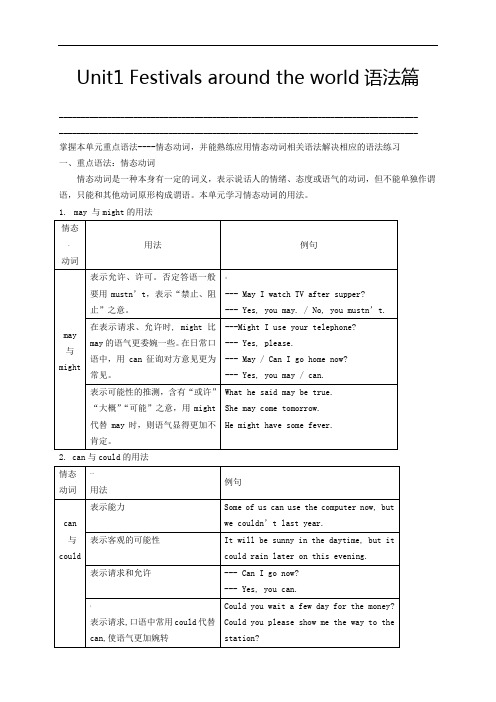
Unit1 Festivals around the world语法篇____________________________________________________________________________________________________________________________________________________________________掌握本单元重点语法----情态动词,并能熟练应用情态动词相关语法解决相应的语法练习一、重点语法:情态动词情态动词是一种本身有一定的词义,表示说话人的情绪、态度或语气的动词,但不能单独作谓语,只能和其他动词原形构成谓语。
本单元学习情态动词的用法。
1.may 与might的用法2. can与could的用法…3. will与would的用法4.shall与should的用法5. must, may (might) 和can表示“推测”的用法6.should与ought to用法;7.need与dare用法ed to与would用法例1.(2019北京卷27.)________ I have a word with you? It won’t take long.A. CanB. MustC. ShallD. Should解析:本题考察的是情态动词基本意义辨析。
can能够,可能;must必须,一定;非得;shall将要;:should应该;句意:我可以和你谈谈吗?不会花很多时间的。
根据句意可知本题使用Can I…?表示询问对方是否允许。
如:Can I use your dictionary? 我可以使用你的字典吗?答案:A。
例2.(2019大纲卷)30. Although you _____ find bargains in London, it’s not generally a cheapplace to shop.A. shouldB. needC. mustD. can解析:should应该,竟然;need需要;must必须,一定;非得,偏偏;can能够,可能,有时会…;根据句意“尽管你有时可能会在伦敦找到便宜货,但总得说来那不是一个购物的便宜的地方。
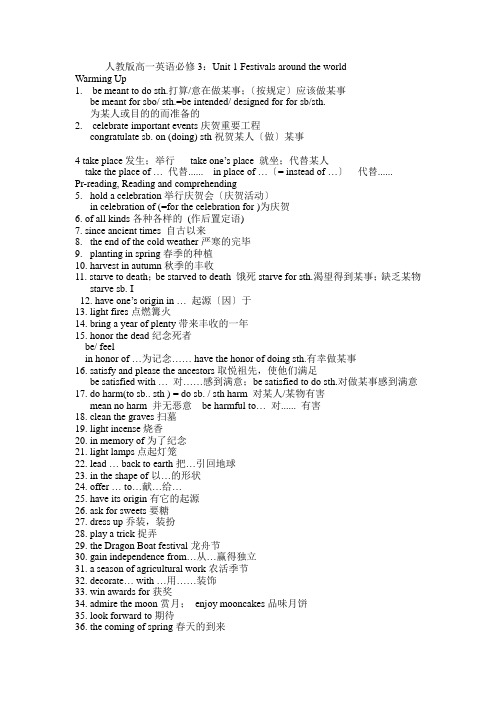
人教版高一英语必修3:Unit 1 Festivals around the worldWarming Up1.be meant to do sth.打算/意在做某事;〔按规定〕应该做某事be meant for sbo/ sth.=be intended/ designed for for sb/sth.为某人或目的的而准备的2.celebrate important events庆贺重要工程congratulate sb. on (doing) sth祝贺某人〔做〕某事4 take place发生;举行take on e’s place 就坐;代替某人take the place of …代替...... in place of …〔= instead of …〕代替......Pr-reading, Reading and comprehending5.hold a celebration举行庆贺会〔庆贺活动〕in celebration of (=for the celebration for )为庆贺6. of all kinds各种各样的(作后置定语)7. since ancient times 自古以来8.the end of the cold weather严寒的完毕9.planting in spring春季的种植10.harvest in autumn秋季的丰收11. starve to death;be starved to death 饿死starve for sth.渴望得到某事;缺乏某物starve sb. I12. have one’s origin in …起源〔因〕于13. light fires点燃篝火14. bring a year of plenty带来丰收的一年15. honor the dead纪念死者be/ feelin honor of …为记念…… have the honor of doing sth.有幸做某事16. satisfy and please the ancestors取悦祖先,使他们满足be satisfied with …对……感到满意;be satisfied to do sth.对做某事感到满意17. do harm(to sb.. sth ) = do sb. / sth harm 对某人/某物有害mean no harm 并无恶意be harmful to…对...... 有害18. clean the graves扫墓19. light incense烧香20. in memory of为了纪念21. light lamps点起灯笼22. lead … back to earth把…引回地球23. in the shape of以…的形状24. offer … to…献…给…25. have its origin有它的起源26. ask for sweets要糖27. dress up乔装,装扮28. play a trick捉弄29. the Dragon Boat festival龙舟节30. gain independence from…从…赢得独立31. a season of agricultural work农活季节32. decorate… with …用……装饰33. win awards for获奖34. admire the moon赏月;enjoy mooncakes品味月饼35. look forward to期待36. the coming of spring春天的到来37.give children lucky money in red paper用红包装着压岁钱给小孩38. dragon dances舞龙灯39. the lunar New Year阴历新年40.day and night整天;日夜41.colorful clothing of all kinds各种艳丽的衣服42. Christian countries信奉基督教的国家43. be covered with被…罩着44. as though好似45.love to get together to eat, drink and have fun with each other喜欢聚在一起吃、喝、玩耍46.enjoy life享受生活47. forget our daily work for a little while暂时忘记日常生活中的烦恼Learning about language and using langbuage48. have a good time with和…一起开心49. at the parking lot在停车场50. be heart-broken心都碎了51. at the coffee shop在咖啡馆里;after work下班后52. turn up出现53. right now立即54. keep one’s word守信誉55. hold one’s breath屏气56. drown one’s sadness in coffee用咖啡来解愁57. wipe the table擦好桌子58. visit the earth下凡来到人间;(be) on earth在人间59. the herd boy牛郎60. set off for home动身回家61. remind sb. of …因…想起某人62.pass the tea shop on the corner路过在转角处的茶馆63. wave at sb. 向某人招手Workbook64. wipe all one’s tears拭去泪水;hide the sadness on one’s face掩盖住脸上的悲伤65. dream about going back to one’s homeland 日夜梦想回到祖国66. win the beat actor at the Golden Rooster Award 荣获金鸡奖的最正确男演员67.be ready for a second try准备第二次尝试68.leave sb. alone让某人一个人呆会69. full-time workers全职工70.have free time有时间71 ask for permission恳求答应72.have an eye examination参加一个视力检测73.sit in a café坐在咖啡厅里74.32 degrees below freezing零下32度75. pile… up along the sidewalks沿着人行道把…堆起来76. ride in horse carriage乘座马车77.admire the ice sculptures欣赏冰雕78. be dressed in heavy clothes穿了厚厚的衣服。

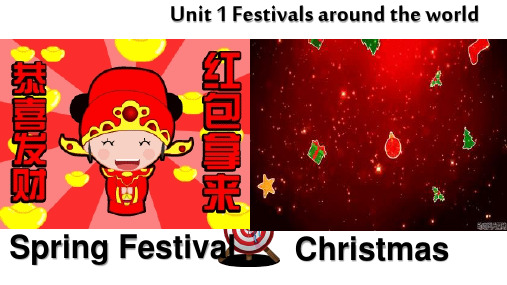

Unit1 Festivals around the worldTeaching aims:1. TopicFestivals; how festivals begin; how to celebrate festivals2. Useful words and expressions:Starve plenty satisfy ancestor lamp lead feast bone origin trick poet arrival national gain independence gather agricultural European custom award watermelon handsome rooster admire energetic forward Easter clothing religious social Christian daily permission possibility fool apologise drown sadness obvious wipe lovely couple weep announcer forgiveTake place in memory of dress up play a trick look forward to day and night as though have fun with turn up keep one’s word hold one’s breath 3. Functional items:1)RequestCould /Would you please…?Could I have…?Could we look at…?I look forward to ….May I see…?2)ThanksIt’s very kind of you…Thank you very much/thanks a lot.I’d love to.It was a pleasure….Don’t mention it.You are most welcome.4. Structures情态动词can, could, may, might, will, would, shall, should, must, can’t 等的用法。


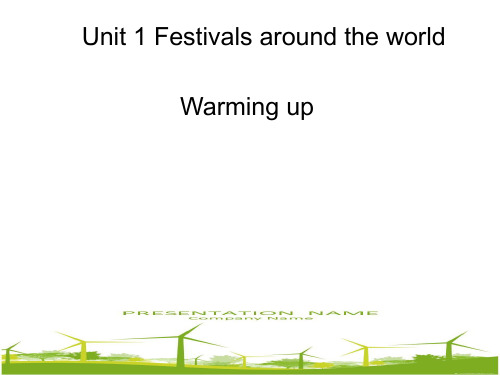

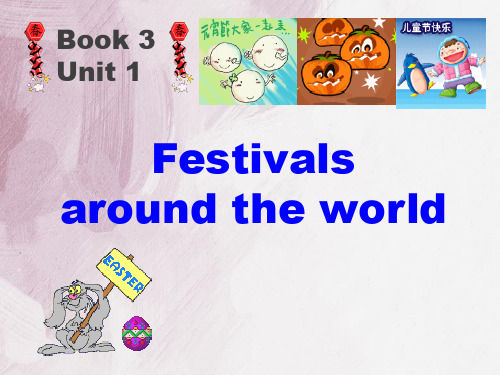
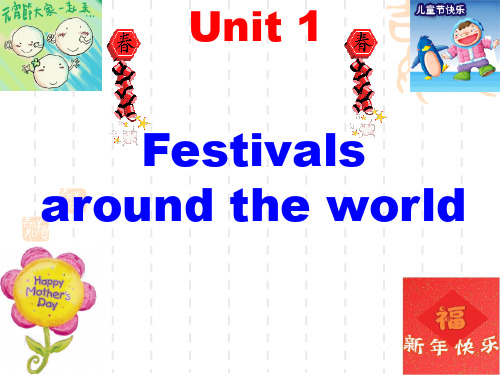


人教版高中英语必修3《Unit1Festivalsaroundtheworld》教案人教版高中英语必修3《Unit 1 Festivals around the world》教案教学准备教学目标(1) 增进学生对中国节日的理解,了解和感悟外国的节日;(2) 提高学生的社会文化素质,加强跨国文化素质;(3) 培养学生运用资源策略。
教学重难点(1) 本单元的生词和短语;(2) 掌握一些情态动词的基本用法;(3) 了解有关节日和民俗,掌握有关词汇,如custom,religious 等。
教学工具课件教学过程Step 1. Leading-inPurpose: To activate Ss and arouse them to express their opinions about a festival.Lead Ss to the content of this unit. Teacher may say, “Do you know what is called the Christmas of China? The Spring Festival. Yes. The oldest and most important festival in China is the Spring Festival. Each country and each nation has its own festivals. Today we are going to learn something about the different festivals.”Step 2. Warming Up1. Ask Ss to turn to P1 and work in groups to complete the form on P1.2. Ask Ss to discuss festivals they have filled in the form and their importance to the society. After that, ask Ss to present theiropinions to all classmates.Step 3. Pre-listeningPurpose: To help Ss learn about the context of the Listening text.Ask Ss to talk about the following questions to get them prepared to listen to the reading text.1. How many ancient festivals do you know?2. Are foreign festivals different from Chinese festivals? In what part?Step 4. ListeningPurpose: To get the main information in the listening part.To develop Ss’ listening abilityTo learn some information about the festivals around the world.Ask Ss to listen to the tape, focus on the subjects mentioned in the passage and then answer the following question.1. How many kinds of festivals were mentioned in the text?Suggested Answer: Five.2. What are they?Suggested Answer:Ancient FestivalsFestivals of the DeadFestivals to Honor PeopleHarvest FestivalsSpring FestivalsStep 5. Pre- readingDivide Ss into groups of four and ask them to discuss the following questions.1. What’s your favorite holiday of the year? Why?2. What festivals or celebrations do you enjoy in your city ortown? Do you like spending festivals with your family or with friends? What part of a festival do you like best---the music, the things to see, the visits or the food?Step 6. Fast readingAsk Ss to read the text quickly and answer the following questions.1. What are festivals of the dead usually for?2. What make autumn festivals happy events?3. What do people usually do at spring festivals?4. What is one important reason to have festivals and celebrations?5. Compare the festivals of the dead in Mexico, Japan and China. What things are similar? What things are different?Suggested Answers:1. Festivals of the dead are for honoring or satisfying dead ancestors or others, who some people believe might return to help or harm living people.2. Autumn festivals are happy events because people are thankful that food is ready for winter and the hard farm work is finished.3. At spring festivals, people usually have dances, carnivals and other activities to celebrate the end of winter and the coming of spring.4. It is important to have festivals and celebrations so we can enjoy life / be proud of our customs / forget our work for a little while.5. The Chinese, Japanese and Mexican festivals of the dead all have customs to honour the dead. The Chinese and Japanese go to clean their ancestors’ graves, and the Mexican offer food, flowers and gifts to the dead. However, there are somedifferences. The Mexicans eat special food that looks like bones, something the Chinese and Japanese do not do.Step 7. Intensive reading1. Ask Ss to read the text carefully and sum up the main idea of each part.2. Discuss in pairs which festivals you think are the most important and which are the most fun. Then fill in the chart with your ideas.Type of festival Example of festival Reasons for your choice Most importantMost funSuggested Answer:Various answers are acceptable.3. Ask Ss the following question and encourage Ss to give some similarities that they think festivals have, and give their reasons. Then invites Ss to tell the similarities and then ask them to present them before the class.What similarities can you find among these festivals?Suggested Answer:They most include food, music or entertainment, like dances, light or fire.They are most together with family and friends.Festivals exist everywhere.Many of them celebrate similar ideas and important cultural events or remember event of people.Human beings need to have things in life to celebrate and have a break from daily struggles and demands.Step 8. HomeworkPurpose: To get a further understanding of the text.1. Ask Ss to continue discussing their opinions about festivalswith their partners.2. Ask Ss to read the text once again and try to retell the text.3. Ask Ss to discover useful words and expressions in the text.课后小结学了这节课,你有什么收获?课后习题完成课后练习题。